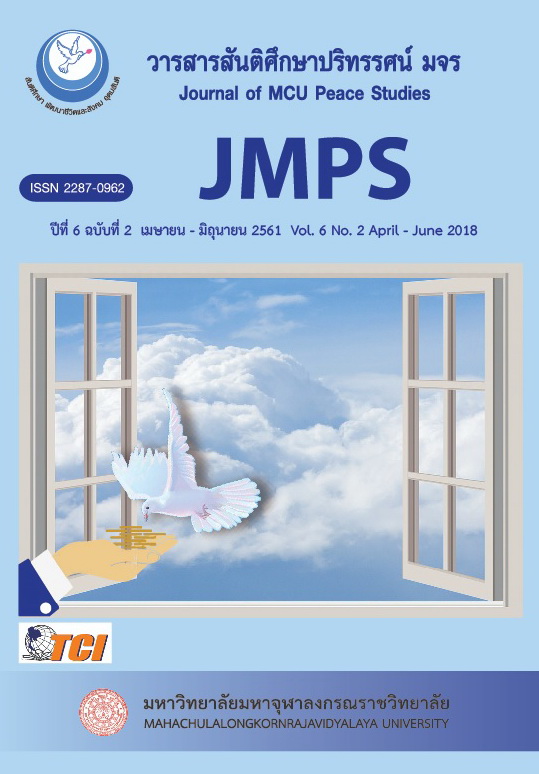A Model of Thai Sangha Administration in the Future
Main Article Content
บทคัดย่อ
This dissertation entitled ‘A Model of Thai Sangha Administration in the Future’ has three objectives: 1) to study the model in governing Sangha in Tipiṭaka, 2) to study the problems and obstacles in governing Thai Sangha, and 3) to propose the model in governing Thai Sangha in the future. This is a qualitative research.
In the study, it was found that in the Buddha’s times the problem of caste in society had been solved by the Buddha through establishment of Sangha community with a view to provide the certain place wherein one can live the righteous life and such a community is held as the simple way of living life by which one can detach one’s mind from defilement and can seek Summum Bonum, Nibbãna. As far as the Order in Tipiṭaka is concerned, most of models in governing Sangha at earlier period were done by the Buddha Himself and later on He sometimes ruled the Sangha and also passed the works to His disciples. However, when it came to the final period, He established Sangha to act on behalf of Dhamma and Vinaya to control Buddhist monks’ behaviours in the good manners, if there was accusation raised in the Sangha then the settlement of legal procession was used to solve it. In this matter, certain tenets supporting such a government were also provided so to effectively rule Sangha resulting in giving more wellbeing to the mentioned Sangha community.
In Thailand, the governing of Sangha has been being developed since the past till now. Right now, it was under the Sangha Act, 2505 B.E. and then it was re-amended, 2535 B.E. and after that it was amended many times till the present. It is claimed that many weak points in it need to be amended because the centralization in governing assumed by the supreme council of Sangha has been giving rise to the narrowness and thereby giving non-decentralization to governing body. Consequently, it has brought about non-good governance causing Buddhist monks’ misbehaviors in Dhamma and Vinaya. Furthermore, it has been given rise to non-Buddhist teachings distorting the Buddha’s words and such phenomena have been weakening Sangha respectively.
In this research, the future model in governing Sangha proposed by this research was shown as follows: the structural system in governing Sangha should be effectively reformed by creating certain strategies to drive Buddhist activities through Dhamma and Vinaya. In reforming it, the decentralization should be made so that Buddhist monks’ taking part in higher level could be expected. With respect to this, the supreme council of Sangha should set up the certain sub-unit by appointing them to be committees in the Sangha parliament for Sangha administrations so that the Sangha’s activities would be quicken. In the appointment of the Sangha leaders in various positions, Buddhist monks in that region should be taken into account, many permanent departments for the different levels of ecclesiastical regional governors should be established so that the accusation raised in the area could be solved in due time and also those Buddhist monks who are good at Dhamma and Vinaya including various laws in society should be appointed and the awareness of the ways leading to prevent the arising of Buddhist future problems should be made so that Buddhism could be stabilized.
Article Details
ทัศนะและความคิดเห็นที่ปรากฏในบทความในวารสาร ถือเป็นความรับผิดชอบของผู้เขียนบทความนั้น และไม่ถือเป็นทัศนะและความรับผิดชอบของกองบรรณาธิการ ยินยอมว่าบทความเป็นลิขสิทธิ์ของวารสาร


